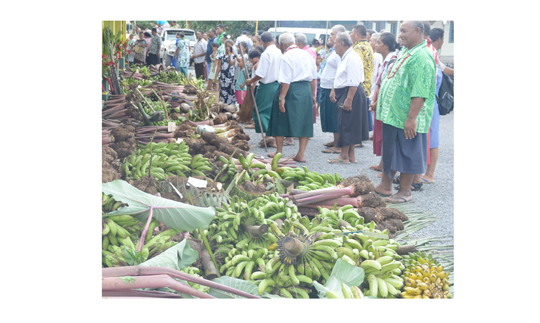Some years back, I went to China on a State Visit in the tropical regions of Southern China where I was shown huge banana and taro plantations bigger than our family-based plantations in Samoa.
Even the menus in the restaurants for entrée, main dishes and desserts were made from taro roots, leaves and stalks.
History, related by our guide, pointed to the First Harvest, be it taro etc., were sent to the Emperor, as it was proper that the Chinese Ruler, who provided peace and protection to the farmers, was honoured in this manner.
The first harvest for village community plantings in Samoa of taro, ta’amu, yams, tapioca etc,is also an old traditional practice in our villages to ensure food security for all.
The village chiefs would approve set targets for plantings for different cash crops like taro, ta’amu, manioc, yams and sweet potatoes, then at harvest time, 6 to 8 months later, a village ceremony is performed to mark the first harvest with feasting.
The Government Agriculture Shows in Apia and Salelologa for many years were deliberate occasions for all farmers and fishermen to sell their produce and livestock to consumers from all over the country.
FAST had budgeted $500,000 tālā for these first harvest ceremonies – but NOW the harvest format has changed.
An example is a village of two distinct sub villages (Falelua o Saleapaga ma Siupapa), without advanced notice, was suddenly blessed with cash handouts for a “First Harvest Ceremony” of $12,000 tālā last week from the honourable Minister of Agriculture, La’auli Leuatea Polata’ivao.
A few of the families managed to procure some produce from the market in the pretense of appearing to comply with the ministerial order.
Only a few families (not all of Siupapa subvillage) benefitted whilst Saleapaga subvillage was completely ignored.
The $12,000 tālā was also distributed to only a few chiefs present while the farmers with produce displayed got nothing!
The Minister of Agriculture La’auli, also bears the matai title of Puletiu in Siupapa – a blatant case of conflict of interest and the abuse of public funds provided by donors as grants/budgetary support.
Since the village quoted is one of the three villages in my district, the reason for this gimmick was obvious.
This is to be expected when good governance principles of transparency and accountability are ignored.
Transparency and accountability will ensure that projects must be designed and implemented to avoid discriminatory treatment.
Donors of grants/budgetary support should take note that their aid funds are properly used.
Tuilaepa Sailele Malielegaoi
Leader of HRPP
